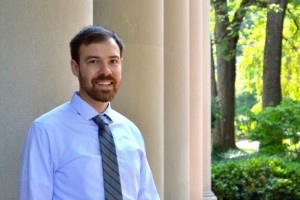
Douglas MacKay, PhD is Assistant Professor of Public Policy at UNC, Duncan and Rebecca MacRae Fellow, and Core Faculty of the UNC Center for Bioethics.
What does Bioethics mean to you?
I would say it’s the normative and empirical study of ethical questions relating to the practice of medicine, research, and policies relating to health.
Why is it relevant? Why do you think that students should get involved in Bioethics?
I think it’s good for people working in health professions to be aware of the ethical aspects of what they’re doing. Basically, the ethical aspects of their fields. I think that there’s a lot of questions relating to bioethics that students should be aware of as citizens as well. They should be able to think through these ethical issues critically.
What would you say is your specialization?
I suppose I would say my main specialization is the main ethics of biomedical and public policy research, but I would say that my secondary specialization is in the ethics of health policy. So my home is the public policy department but I do a little bit of work for the Center of Bioethics.
When did you begin taking an interest in Bioethics?
I suppose when I was completing my PhD I had to teach a couple of courses in it. I started seeing it as something that I wanted to complete research in.
What types of projects are you currently working on?
The big project I’m working on concerns the ethics of randomized controlled trials (RCTs) to evaluate public policies. There’s a ton of literature on RCTs in the biomedical context and policy makers are starting to use RCTs to evaluate public policy interventions. And there’s less reflection on RCTs in the biomedical sphere. I am interested in thinking through whether there are any lessons to be learned from the literature on biomedical RCTs for the methods of public policy RCTs.
The other one I’m working on has to do with the ethics of organ donor registration policy. Basically how governments should go about registering people as organ donors. I’m interested in two questions: the nature of consent and which types of policies can be said to secure to people’s valid consent to donation and whether the use of nudges is okay to get more people to register as organ donors.
The third project I’m working on has to do with the ethics of priority setting in healthcare. I’m interested in how policymakers should evaluate the value of different health states or measure the value of different health states. The second aspect I’m interested in concerns the principles by which policymakers should prioritize treatments in the context in a public insurance program.
The fourth one would be… and I’m not so sure that it’s a project, but it concerns the implications of principles of justice for the conduct of biomedical research. Particularly with respect to questions of standard of care ancillary care and fair subject selection.
What courses do you teach?
I teach POLICY 340: Justice and Public Policy, POLICY 71: Justice and Inequality, and I teach a course called POLICY 780, Normative Foundations of Public Policy, which is a PhD course.
Interview conducted by Olivia Dorsey.
